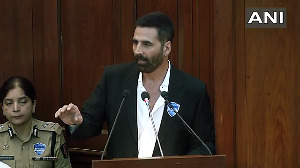
On May 18, 1974, Saddam Hussein was chairing a meeting of the Revolutionary Command Council in his vice-presidential office when a nervous aide slipped a single sheet of paper in front of him. It was a copy of a news story from Reuters that morning, confirming that India had successfully tested a nuclear bomb in the remote Thar desert of Rajasthan. Saddam was impressed, but not amused.
'If the Hindis (Indians) can do it, why can't we?' he asked those at the table.
He had already secretly spent millions on his bomb project and had precious little to show for it. And yet here was starving India, an inferior Third World country that had dragged its bomb to the test site on the back of an ox cart, banging on the doors of the exclusive nuclear club.
The Ba'ath Party had been trying to recruit nuclear experts from all across the Arab world since 1971. There was no reason for any sleight of hand as Iraq had signed the nuclear Non-Proliferation Treaty in 1969. Saddam's mission was to get hold of the technology he needed without showing his true intent. He had two options: he could acquire uranium or he could acquire plutonium.
Because Saddam wanted the bomb and because India had succeeded in building and testing one, Saddam swallowed his contempt for the Indians and took a personal interest in the career of their chief nuclear physicist Raja Ramanna.
Four years after seeing the Reuters report, Saddam invited Ramanna to visit Iraq as his personal guest.
The Indian scientist spent just under a week in the Iraqi capital, touring Tuwaitha and meeting dozens of his Iraqi contemporaries. At the end of his visit, Saddam invited him to his office.
'You have done enough for your country,' he told the bemused Ramanna. 'Don't go back. Stay here and take over our nuclear programme. I will pay you whatever you want.' Saddam reached over to the tall, broad-shouldered physicist and said, 'I expect you to honour this offer.'
Ramanna stayed awake all that night, fearful Saddam would prevent him from catching his flight home. He never went back to Iraq.
At (the CIA headquarters in) Langley in Virginia and at MI6's new headquarters by London's Vauxhall Bridge, the intelligence services' desk officers responsible know Iraq's nuclear army of scientists has not been disbanded and that five separate sets of blueprints for the bomb are still missing.
All that Saddam is missing is the uranium explosive. The Gulf War wrecked his plans to convert the nuclear fuel stockpiled at the Tuwaitha complex. That uranium had been sent back to its suppliers, Russia and France. Even so, surveillance planes regularly scan the country, taking air and water samples, to make sure that Saddam has not managed to hide or acquire other weapons-grade material.
The intelligence agencies are convinced it will not be long before Saddam tries to buy what he covets most on the international black market. More than 2,000 tonnes of weapons-grade plutonium and uranium are stockpiled in military stores around the world. They are surplus to requirements and in many cases poorly protected. Impoverished scientists, soldiers and site managers at power plants, military barracks and dockyards in the former Soviet Union face the daily temptation of making millions by selling just a few kilograms of this material.
Some have tried. Ten officers at a former nuclear base in Belarus, including a general and two colonels, faced court martial in April 1998 for stealing. Six months later police in Turkey seized more than four kilograms of unprocessed uranium and six grams of plutonium smuggled from a military base in Kazakhstan. A group of eight men, including a colonel from the Kazakh army, tried to sell the material to undercover agents for $1 million cash.
Special nuclear tracking units have been set up in major Western capitals to hunt down every gram of plutonium and highly enriched uranium. Even by their own accounting, the experts admit there is scope for pilferage and loss. They call it the MUF' factor Material Unaccounted For. There is more of it than anyone is prepared to admit.
Such operations are seldom reported.
One such operation was the successful ambush by undercover MI6 agents to prevent a consignment of more than six kilograms of plutonium falling into the hands of the Iraqis. The shipment was being smuggled though Eastern Europe and across the Bosporus into Turkey, from where it could be slipped across the border into Iraq. The agents tracked the nuclear pirates as they crossed into Bulgaria, where on a deserted stretch of road they boxed in the lorry with half a dozen vehicles in an operation that lasted a matter of seconds. The plutonium was recovered and no mention made of what became of the smugglers.
Elaborate traps have been set to try to lure Saddam into buying the nuclear hardware he needs. One of these operations involved an Iraqi middleman who helped run Saddam's sanctions-busting. The businessman, who had addresses in Paris and Bonn, was negotiating to buy millions of dollars' worth of spare parts for Iraq's military helicopters.
He met his Russian contact in a hotel coffee shop in Amman. The former Soviet general was as good as his word in providing all the machinery needed for the helicopters. For several minutes, the two went through the details of how they would smuggle the spare parts across the border with Iran. Satisfied with his day's work, the Iraqi handed over the banker's draft drawn on an account in Switzerland. As the Russian slipped the paper into his attaché case and shook hands, he surprised the businessman by whispering that he also had access to enough uranium for one bomb. The Iraqi middleman was a skilled negotiator and showed no emotion as he listened to what the Russian had to offer.
As he drove back across the desert to Baghdad he wondered what to tell Saddam. That night the Iraqi president studied the proposal, looking up at the businessman and then back to the document. His son Qusay was the only other person in the room. As Saddam flicked the file to Qusay, he asked the businessman to describe again how an ex-Red Army soldier could get hold of so much uranium without anyone noticing it was missing. He sensed it was a trap and told his emissary to tell the Russian that Iraq had no interest in such matters.
This was not the first time Saddam believed his enemies had tried to tempt him.
Another offer came from a prominent Pakistani scientist who approached an Iraqi diplomat he knew. While they were walking through a park, the scientist offered to hand over the finished designs of a nuclear bomb. He volunteered to work in Iraqi laboratories to show Saddam's scientists the quickest way of obtaining weapons-grade uranium.
The Pakistani also said he could buy the materials needed from Western Europe without attracting suspicion by using his own offshore company set up in Dubai. Suspecting it was another trick, the diplomat politely declined.
As Saddam has no option but to use the black market or to steal, such 'sting' operations will continue. His own nuclear facilities have been destroyed or dismantled, and he is so closely watched there is little chance of him rebuilding enough to produce the weapons-grade uranium himself. The advanced warhead design centre of Al Atheer is flattened. The huge cauldron magnets were stripped from Tarmiya and Al Faluja, buckled, buried deep in the desert and covered in concrete by weapons inspectors. All that remains of the $18 billion infrastructures that took nearly twenty years to build are a few harmless laboratories at the original nuclear research headquarters at Tuwaitha.
The one priceless asset Saddam can still draw upon is his nuclear army. There remain 7,000 scientists of every discipline dispersed throughout Iraq. To keep their identities a secret from UN inspectors, Saddam sent them to work in schools, hospitals and anonymous factories. Many of them were employed restoring Iraq's electricity network, decimated during the Gulf War.
Saddam made sure they continued to receive their generous salaries even though other Iraqis, including some in the government, were suffering. Those in this nuclear army rash enough to desert risked execution. A handful did get away. What they took with them were the secrets that led the inspection teams to the core of Saddam's nuclear enterprise. They were the first to identify the hidden laboratories and sites like Al Atheer and Tarmiya and explain what was going on inside. They marked the burial sites in obscure government ministries where Saddam had concealed the documents naming his suppliers and all the scientists working on the bomb.
The CIA and other beneficiaries never asked what these defectors had done for Saddam, or how they escaped. The engineer who faked his death by leaving a charred corpse inside his burnt-out car was not asked who the dead man was.
Western agencies cared only about preventing rogue governments from recruiting these scientists. The first six defectors embraced by the Americans were generously rewarded to tempt other colleagues to follow them. The one man they wanted above all was Dr Jaffar Dhia Jaffar. CIA agents who masqueraded as UN inspectors were told their priority was to contact Jaffar and offer him anything he wanted.
Relatives living abroad were courted. His half-English sons were approached and colleagues who had worked with him in the West were contacted to persuade him to leave Iraq. Nothing worked.
Jaffar is so closely watched he knows it would be suicide to try to make a run for it. He is not even sure he wants to. No other job will ever match what he has now. Where else will he have the opportunity to play with the most powerful forces of nature? Jaffar sees himself as the father of the Iraqi bomb. Saddam may have paid for the nuclear programme, but Jaffar has made it work.
He justifies staying on by wrapping himself in the flag. As a born-again patriot, he believes Iraq cannot be denied what its enemies already posses. He told close friends he has spent too long and sacrificed too much to give up now. Many of his colleagues think the same and will not be lured away by any amount of money or other temptations. Fear also plays a part.
There has been only one nuclear refusenik. Hussein Shahristani alone suffered twelve years of torture and solitary confinement for refusing to collaborate on the bomb. At any time he could have been like Jaffar, exchanging his prison cell for a villa in the presidential compound and all the privileges that go with it. Since his escape he continues to defy Saddam. From his sparsely furnished apartment in Tehran he searches for the hundreds of colleagues who have gone missing.
Jaffar and the others who have stayed behind know Saddam is playing the long game. He has seen off the international leaders who went to war with him and has outlasted their successors. All he cares about is his personal survival. He knows that if he stays in power the time will come when he can resurrect Tuwaitha and the rest. Until then whatever money he has at his disposal is spent on preserving his security apparatus and the avaricious relatives who protect him.
Excerpted from Saddam's Bomb, by Shyam Bhatia and Daniel McGrory, TimeWarner 2002, £ 7.99, with Shyam Bhatia's permission
Shyam Bhatia is Senior Editor, rediff.com/India Abroad
Design: Uttam Ghosh





